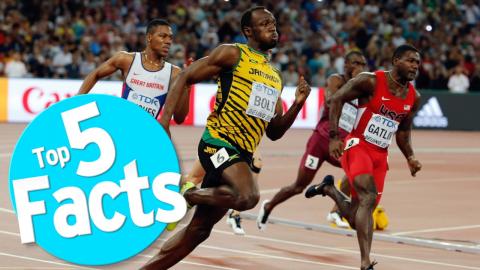Top 5 Facts: The Olympics ROCK

The Olympic motto reads, 'Faster, Higher, Stronger'. When it comes to sporting showcases, there's simply nothing better. Join http://www.WatchMojo.com for Top 5 Facts. In this installment, we're counting down the top 5 reasons why the Olympics are great, with a special emphasis on why hosting them is a great idea for cities. To get a more complete picture of the Olympic debate, we'll also be publishing another episode of Top 5 Facts where we count down the Top 5 Reasons Why the Olympics Suck.
Special thanks to our user Rashedshody for submitting the idea on our Interactive Suggestion tool at http://www.WatchMojo.comsuggest
WMFacts: The Olympics ROCK
The Olympic motto reads, ‘Faster, Higher, Stronger’. When it comes to sporting showcases, there’s simply nothing better. Welcome to WatchMojo's Top 5 Facts. In this installment, we're counting down the top 5 reasons why the Olympics are great, with a special emphasis on why hosting them is a great idea for cities. To get a more complete picture of the Olympic debate, we’ll also be publishing another episode of Top 5 Facts where we count down the Top 5 Reasons Why the Olympics Suck.
#5: The Opening Ceremony is a World Class Cultural Showcase
A unique insight into a host nation’s history and culture, the opening ceremony has taken on greater and greater significance in recent years. Since Moscow 1980 in particular, the event has gotten grander with each new Olympiad, hitting a costly high with the opening show for Beijing 2008, which reportedly required a spend of over $100 million. The artistic program is what sets each ceremony apart, and are usually used to tell the story of the host nation in spectacular fashion. Beijing, for instance, showcased the prosperity of Ancient China, Chinese Opera, and the Silk Road Rio’s ceremony is set to be staged on a dramatically reduced budget, but it’s not likely to be any less impressive.
#4: The Olympic Flame Shines Light on Other Issues
Often, sport exists apart from other social issues, conflicts and debates going on in the world at any one time. But, because of it’s unprecedented international value, the Olympics has historically proven more than just an athletic celebration. Berlin 1936 saw Jesse Owens win four gold medals in front of Adolf Hitler; Moscow 1980 saw over 60 nations boycott the games, in protest over the Soviet invasion of Afghanistan; in turn, Los Angeles ‘84 was subject to a Soviet-led boycott, keeping international politics at the forefront of every sports-fan’s mind; more recently, Sochi 2014 put even greater emphasis on the campaign for LGBT rights. Sport is important, but during the Olympics it doesn’t overshadow the socio-political climate of the time. In fact, it makes it impossible to ignore important social issues, which otherwise might go unnoticed.
#3: It Puts a City 'on the Map'
Critics say the Olympics are too often hosted by already established cities, but there are examples in which the Games have served as a spark for lesser-known locations. The Winter Olympics in particular often draw attention to less familiar places, like Albertville and Lillehammer, but the Summer Games inspire an unparalleled international focus. The 1968 Games in Mexico City were a watershed moment for Latin American sport, while four years prior in ’64, Tokyo hosted the first ever Olympic Games in Asia, displaying how fully they’d recovered following World War II. In 1992, after decades of neglect, Barcelona was significantly revamped in part because of the Olympics. Even London 2012 breathed new life into an otherwise underused part of England’s capital. Under-budgeting and overbuilding create obvious disadvantages, but the best-planned Olympics have enduring benefits for the host area.
#2: Inspiration Through Sport
London 2012 led with the tagline ‘inspire a generation’, which is an appropriate motto for almost any Olympic Games. Just over two weeks of endless sporting effort and achievement, it’d take an incredibly uninspired person not to get at least a little wrapped up in the feel-good factor. In 2012, Team GB dominated the cycling events, and British cycle sales promptly rose to record highs. Usain Bolt taking the world’s breath away by turning a world record sprint into a casual stroll; Kerri Strug landing her vault on a sprained ankle to win gold... These are men and women working at the absolute peak of their abilities, redefining the limits of human potential; if that doesn’t get you out for a weekly jog round the park, nothing will.
#1: The Games Represent Equality and Unity
We’re regularly exposed to images of countries at war, but the Olympics are the rare occasion where we can see over 200 countries basically playing together. It truly is a global affair, and the Olympic Flag is indicative of that. When the five rings were first conceived in 1914, they were described as representing ‘five parts of the world won over to Olympism and willing to accept healthy competition.' And, since Rome 1960, the Paralympics have brought disabled sport under the spotlight as well. President of the International Association of Athletics Federations, Sebastian Coe, has previously described 2012’s Paralympic Games as having ’a seismic effect in shifting public attitude’ toward disability in sport, humanizing people who are often marginalized in society.
So, what do you think? Are the Olympics a good thing overall? Or do their downsides outweigh their benefits? Be sure to check out our Top 5 Facts video about why the Olympics might actually be a horrible idea to get both sides of the story. For more world record Top 10s and personal best Top 5s, be sure to subscribe to WatchMojo.com.
